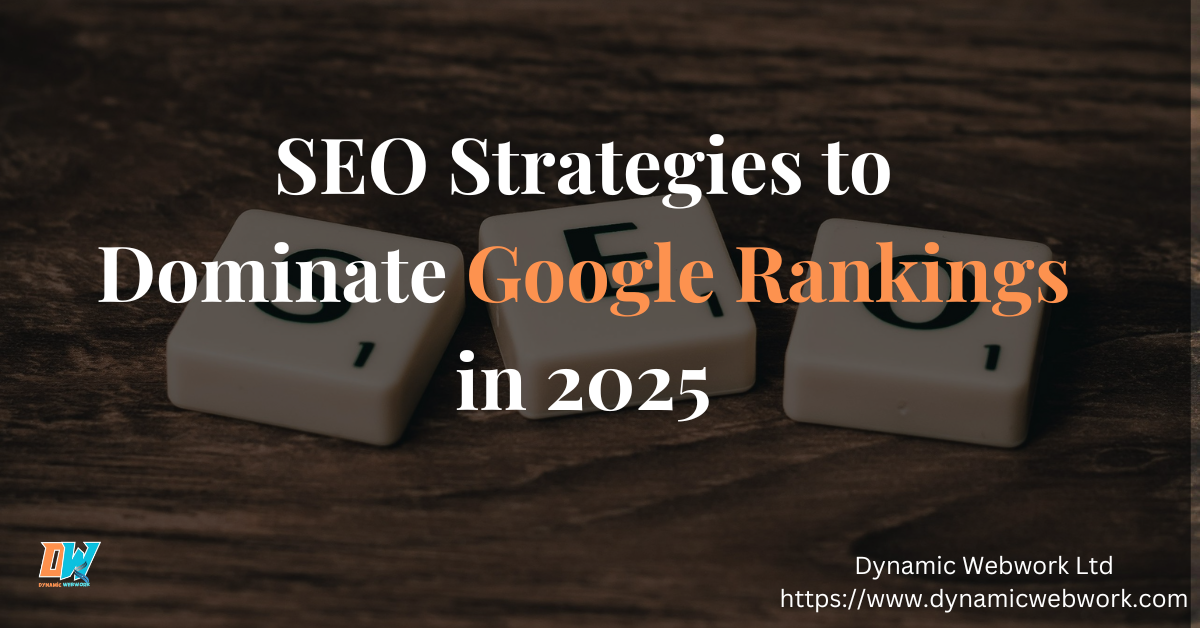10 SEO Strategies to Dominate Google Rankings in 2025
Search engine optimization (SEO) continues to be a cornerstone of online success. With search engines evolving rapidly, businesses must stay ahead of the curve to secure top rankings on Google. As we move into 2025, mastering SEO requires an understanding of advanced strategies, user-centric approaches, and leveraging cutting-edge technology. Below, we explore actionable SEO strategies to help your website dominate Google rankings in 2025.
1. Focus on User Intent and Search Experience
Google’s algorithm prioritizes user intent and the overall search experience. To align with this trend:
Analyze Search Intent: Understand whether users are looking for informational, transactional, or navigational content. Tailor your pages to meet their needs.
Create Comprehensive Content: Write in-depth articles that address user queries thoroughly. Use headings, bullet points, and structured data to enhance readability.
Enhance User Experience (UX): Ensure your website is mobile-friendly, fast-loading, and easy to navigate. Google’s Core Web Vitals, such as Largest Contentful Paint (LCP) and First Input Delay (FID), will remain crucial.
2. Leverage AI-Driven Tools
Artificial intelligence (AI) is reshaping how SEO strategies are executed. In 2025, successful websites will use AI-driven tools to gain a competitive edge:
Content Creation: Use AI tools like ChatGPT or Jasper to create high-quality, SEO-optimized content at scale.
Keyword Research: Employ AI-powered platforms to uncover high-intent keywords and track shifting trends.
Predictive Analytics: Analyze user behavior and predict search trends using AI to stay ahead of competitors.
3. Prioritize Voice Search Optimization
With the growing adoption of voice assistants like Alexa, Siri, and Google Assistant, optimizing for voice search is critical. Key steps include:
Use Conversational Keywords: Focus on long-tail, natural language keywords that mimic how people speak.
Answer Questions Directly: Create FAQ pages to address common queries in a concise and informative manner.
Optimize for Local SEO: Voice searches are often local, so ensure your Google My Business profile is complete and accurate.
4. Create High-Quality, Evergreen Content
Content remains king, but its longevity and relevance are equally important. Strategies for 2025 include:
Invest in Pillar Content: Create cornerstone articles that cover broad topics and link to related subtopics.
Update Existing Content: Regularly refresh old blog posts and pages to keep them relevant and maintain rankings.
Use Multimedia: Incorporate videos, infographics, and interactive elements to engage users and increase dwell time.
5. Optimize for Visual Search
Visual search is gaining traction with platforms like Google Lens enabling users to search using images. To capitalize on this trend:
Add Descriptive Alt Text: Ensure all images have relevant and descriptive alt attributes.
Use High-Quality Images: Optimize image resolution and size to balance quality and loading speed.
Leverage Structured Data: Use schema markup to enhance your images for visual search engines.
6. Build High-Quality Backlinks
Backlinks remain a vital ranking factor. However, quality trumps quantity in 2025. To build a strong backlink profile:
Focus on Authoritative Sites: Seek links from websites with high domain authority and relevance to your niche.
Guest Blogging: Contribute valuable content to other websites in exchange for backlinks.
Leverage Broken Link Building: Identify broken links on relevant websites and suggest your content as a replacement.
7. Embrace E-A-T Principles
Google’s focus on Expertise, Authoritativeness, and Trustworthiness (E-A-T) will continue to shape rankings. To align with E-A-T:
Showcase Expertise: Highlight your credentials and industry expertise on your website.
Cite Authoritative Sources: Link to credible references and include author bios for your content.
Encourage Reviews and Testimonials: Build trust by showcasing positive reviews on Google and third-party platforms.
8. Optimize for Mobile-First Indexing
Google now predominantly uses mobile-first indexing, making mobile optimization non-negotiable:
Use Responsive Design: Ensure your website adapts seamlessly to all screen sizes.
Optimize Page Speed: Compress images, enable browser caching, and use a content delivery network (CDN).
Simplify Navigation: Design mobile-friendly menus and forms to enhance usability.
9. Harness the Power of Video SEO
Videos are dominating content consumption, and optimizing them can boost your rankings:
YouTube Optimization: Use keyword-rich titles, descriptions, and tags to improve video visibility.
Embed Videos on Your Website: Enhance engagement by embedding relevant videos on your pages.
Create Transcripts: Include video transcripts to make content accessible and improve SEO.
10. Measure, Analyze, and Adapt
SEO is an ongoing process. Use analytics tools to track performance and refine your strategies:
Monitor Key Metrics: Track organic traffic, bounce rates, click-through rates, and conversions.
Conduct Regular Audits: Identify and fix technical SEO issues, such as broken links and duplicate content.
A/B Test SEO Tactics: Experiment with different strategies to determine what works best for your audience.
Conclusion
In 2025, dominating Google rankings will require a blend of user-centric strategies, advanced technology, and continuous adaptation. By focusing on intent-driven content, leveraging AI tools, optimizing for voice and visual search, and adhering to E-A-T principles, you can stay ahead of the competition. Remember, the key to long-term SEO success lies in delivering value to your users and maintaining a proactive approach to the ever-evolving search landscape.

